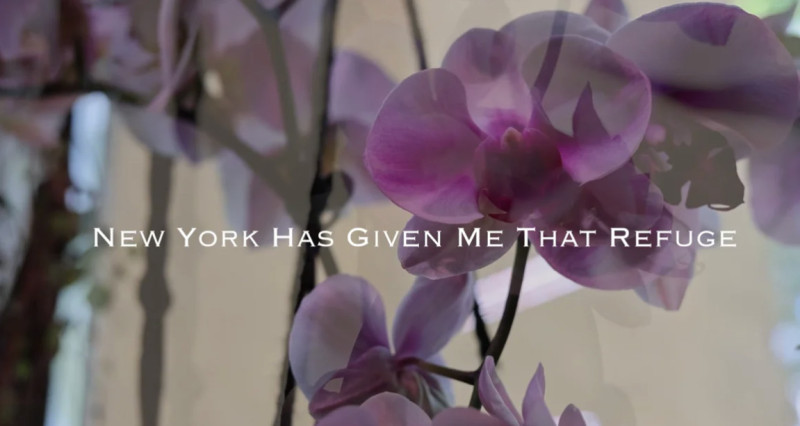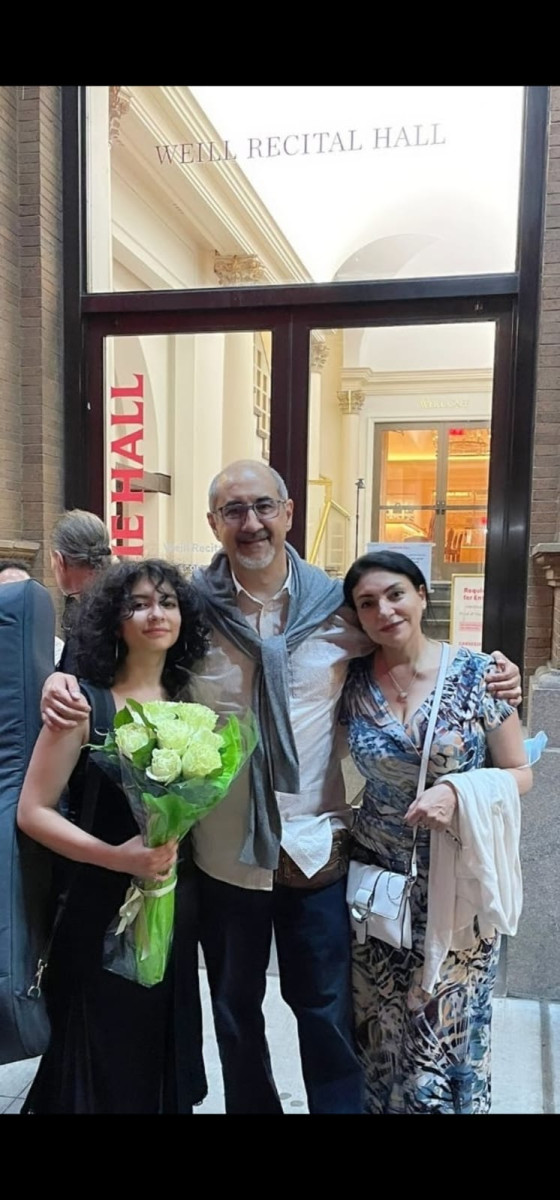
New York has given me that Refuge
In this film, refugee South Asian LGBTQ+ activist Barbara Khan talks about her migration from Pakistan and her life in New York as a trans woman.

What do you think makes New York such a prevalent kind of city of refuge and refugees in a sense? Is there something specific about New York you think, that distinguishes it from other cities in the world as a specific, like sanctuary city?
It is the classic city of immigrants’ arrival through Ellis Island, through the late 19th century. It was the port of entry for most refugees and immigrants, either legal or being fleeing war from Europe.
New York became welcoming because the purpose was to make money, so that was one particular reason. And over time, people settled and found their niche. New York also became a very progressive, politically local government through the 20th century providing support for working classes. And I guess this allowed working class immigrants to stay and not go to the suburbs because it allowed them to be integrated and get benefits. New York City has a very long history of both accepting immigrants and refugees and accepting them so that they could work and make money and accepting them and integrating them through political machines like other political machines and through other forms of associations and trades and work. I think that it has a very long tradition. And it’s following its tradition by pursuing these what is currently referred to as sanctuary city policies.
How would you describe your life in New York City? Do you have the Persian community that you have around you, or is it very mixed, with Columbia colleagues, faculty, New School?
New York is not a destination, it’s not a place of Persian immigrant communities. A lot of Iranians who end up in New York City are the Iranians, who don’t want to settle in suburban and middle-class neighborhoods. There is a Jewish-Iranian community in Forest Hill and in Queens, but in a sense, it is a subset of the Jewish community, not as a subset of Iranian. Big Iranian communities in the United States are in Los Angeles, in Austin, Texas and in Washington, DC. There is no expat Iranian community here in Manhattan. And even though my wife would like to have more connection with Persian speakers, it’s ended up not being that way because she integrates through her coworkers. I thought after my experiences, that my Iranian colleagues that are in New York City would have been interested in hearing about my experiences. But I will tell you that it’s now six years in New York City, and hardly anyone has reached out… Except for [one group of] old Iranian friends. There is a group of Iranians who have been in New York City for 20, 30, 40 years. And I knew them from the past. And we do get together occasionally. But there are a small group of maybe 10-15 people, but otherwise there is no big, large community.
Let’s talk about the Center and in what way your situation influences your academic work generally?
I’m the coordinator of the Committee on Forced Migration, which is an initiative that was started in 2018 by the President’s office and the Columbia Global Centers. I was brought on board in 2019 and as coordinator I was not engaged in this responsibility because of my position as a refugee or as a migrant or even as a displaced scholar. It just happened that I was available and suited to take up the mantle of this project. For the first few years my own work, which is on local politics and local civil society movements and local government and local democracy issues didn’t impinge directly on immigrant issues in New York… […]
I will share with you something just on a personal level, which does motivate my research a bit. I am curious about my colleagues who tend to be on the left of the political spectrum, not on the extreme left, but I refer to myself as maybe a kind of moderate left position, centrist left position. I am curious about the way in which there is a kind of complacency about the question of how to handle legal and illegal immigration in the United States. And I think that’s dangerous for democracy in the United States. So, this is part of the motivation why I’m interested in looking at this issue. At a very personal level, I should say in my family, people will say that they feel it’s unfair the way in which, let’s say, amnesty is given to illegals [“undocumented” migrants]. And I’ll tell you the reason, we have been waiting 14 years. We have a petition for my wife’s family for a U.S. immigrant visa, and we were told that it would take a long time because our siblings and other family members, they’re not the top priority. If we wait in line for 14 years, to do everything legally, everyone else should do that too. I understand all the context of the global political economy of migration. But on the other, there is this understanding that there is something about the immigrant experience which is related to the rule of law. This become one motivation of the kind of issue that I’m interested to study as far as the impact on my work at the center, as the coordinator for the Committee on Forced Migration, it doesn’t impact it directly because my goal is to create the best environment and domain for other scholars to do their work and to create a network of scholars on whatever topic they want to do and from whichever angle they want to do it. But I’m throwing my hat in the ring, so this is what this center is doing. And I look forward to continuing it.
What are your suggestions for the American left on how to deal with the question of illegal or criminalized migration?
I think we should make a distinction between refugees, the legal migration regime, and the question of illegal immigration. I think all of these are three separate issues. They should be all taken on their merits. I have a particular view on that. The issue of refugees, I think, is not that controversial. I mean, Trump made an outlier for American society, saying we shouldn’t take any refugees and so forth. Most survey results show very clearly that the majority and the median American public opinion supports refugees as long as they’re vetted and there is strong majority support for immigration, legal immigration from everywhere and people, with contextual discussions about skill base and so on and so forth.
But essentially, America is a pro-immigration population, but it has to be legal. There is the left political leadership, and the intellectual left leadership is way out of line from American popular public opinion. It’s way to the left. The position that I believe that we should promote is high immigration, because immigration is a benefit both for the economy and for the society, but strict enforcement of all types of immigration… […] And the question of integration is this is like common sense. There really is no debate about this. Of course, you let people in as long as they are, you know, vetted. They follow the rules, they follow the procedures.
We’re an immigrant country. People agree with immigrants. People support immigrants, immigrants become great citizens. They support American society. But the question of illegal immigrants, I think the left should become more in tune with public opinion and should get more into the center – enforcement is very important.
I don’t believe in criminalization. It’s a sort of fuzzy legal issue, whether being in the country [illegally] is a crime or a civil offense. The point is no country in the world has a border as chaotic as we have on the southern border. And it doesn’t help anyone. It’s awful for the migrants who are coming in. It’s not the migrant’s fault. It’s a problem of poor state capacity. We don’t do many things particularly well in the United States. Look at our subways, look at how we deal with the poor mental health issues. We should not be leaving people in the street…We can’t build enough housing to house people. So, I think that this is a case of poor government’s capacity and poor government performance.
Kian Tajbakhsh – Iranian Political Exilee and Coordinator of the Committee on Forced Migration, Columbia University. He was born in Iran and came to New York in the fall of 1984 for the first time. In around 2000-2001 he decided to move back to Iran and leave his academic position. In 2007 he was arrested for “promoting Western forms of democracy” for the first time and in the summer of 2009 a second time. After spending more than a year and half in Evin Prison, from 2010 to 2016 he remained under house arrest unable to work or leave the country. In February of 2016 he was released and returned to New York City with his family.
Interview conducted by the We Refugees Archive team with Kian Tajbakhsh in the spring of 2022. The interview was edited for length and clarity.